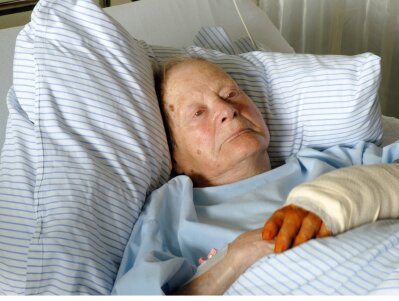CNA's Working in Hospice Care
 Challenges Nursing Assistants Face Working in Hospice Care
Challenges Nursing Assistants Face Working in Hospice Care
Because hospice care is designed to alleviate patient discomfort and to help them cope with facing death, your role as a CNA can become quite trying at times. Whether you see patients on a daily or weekly basis, you will often find their status to be ever changing. Depending on the nature of their illness, rapid degeneration in the physical state can occur rather quickly, and you could face a variety of situations each shift. Arrive for home visits or at your work facility physically and mentally prepared to make a judgment call on patients’ physical and emotional status, care for their hygiene needs, and serve as an emotional support system. These are a few challenges concerning the support services you should be prepared to monitor and handle as a hospice CNA.
Pain Management
Pain management is frequently a component of the hospice process, especially when handling cases involving palliative care, which is primarily for terminally ill patients with a life expectancy of six months or less. For the most part, you will encounter cancer patients within this type of care, but many patients with organ failure and other issues often seek palliative assistance. However, as a CNA or nursing assistant, you not be qualified to administer medications to patients, but that does not lessen the importance of your role when it comes to patient care.
Inpatient care lessens your workload to some extent, as registered nurses, vocational nurses, and physicians will be on hand to keep track of medication dosages and their administration. Home care hospice changes your role significantly, as you will likely be overseeing patients self-administering medications or observing family members doing so. You will need to document the time and dosage of all administered medications that occur in your presence, as well as the patient’s levels of pain during your visits. Recording this information is essential to assisting nurses and doctors trying to find the best approach to managing the patient’s pain.
Medications aside, you can make patients feel comfortable with light massages during grooming duties, which certainly can assist with their pain. One of the benefits of being a hospice nursing assistant or care administrator, is the personal effect your kind actions can have on improving one’s quality of life. Just a few extra minutes of special attention from you can mean something special to those you care for.
Personal Care
The level of personal care and grooming each patient requires will depend on his or her level of illness. If you have the benefit of working for a hospice that attempts to keep you assigned to a specific set of patients, then you will know what to expect each visit. New patients, or filling in for someone else could present new challenges, as you will not be familiar with their typical personality, habits, routine, or medication regimen. This is just one reason why nurses and nurse aides keep such good notes, and you will certainly find yourself counting on other staff members to keep you apprised of each patient’s condition.
When working in a routine or continuous home care situation, you will find the experience to differ drastically from providing services for inpatient or respite care. Within a facility, everything you need to perform your duties is readily available. Home care requires you to bring along any necessary hygiene supplies, or ensure that they are already on hand at the patient’s residence. Essentially, you may need family members to offer you guidance as to where supplies are kept if the patient is unable to. When working in home care, you will discover that you rely on family members’ assistance as much as they do yours. Naturally, paperwork involving staff communication, billing, and reordering these supplies become a part of your job description.
One part of this position that people often find surprising, is that they essentially become educators for family members of patient’s in hospice care. Bedridden patients in the home setting will need someone to change adult diapers, bedding, and perform grooming duties during times when support services are not there. Part of what you will do is offer instructions to the patient’s caregivers on how to handle these actions, as there are tricks to the trade that only trained professionals can explain.
Emotional Support
Social workers and chaplains are traditionally the primary emotional support providers assigned to patients; however, as a hospice CNA, you will discover that you will spend much more time with the patients than they have the capacity to. Essentially, terminal patients and their families will often  turn to you when they have questions concerning death, the process of the body failing, and for support when the situation worsens. Realistically, you cannot always have the right answers, as no two situations are precisely the same. Spirituality may certainly be a factor, and you will likely be apprised of the patient’s religious beliefs through paperwork, and you have to keep these things in mind if your charges attempt to discuss these issues with you.
turn to you when they have questions concerning death, the process of the body failing, and for support when the situation worsens. Realistically, you cannot always have the right answers, as no two situations are precisely the same. Spirituality may certainly be a factor, and you will likely be apprised of the patient’s religious beliefs through paperwork, and you have to keep these things in mind if your charges attempt to discuss these issues with you.
These situations may cause you to feel as though you are toeing the line, so to speak, and it is necessary for you to use caution with your responses. Keep in mind that if in doubt, you should contact the case supervisor who can order the appropriate personnel to make a visit to the patient or family members to assist with situations you feel uncomfortable responding to. With time on the job and experience with hospice situations, you will likely find yourself more capable that you ever realized when it comes to handling the emotional needs of charges in a compassionate manner. Every passing day will provide you with new insight, and you can take comfort in knowing that you made a real difference in people’s lives.
453 total views, 1 today
